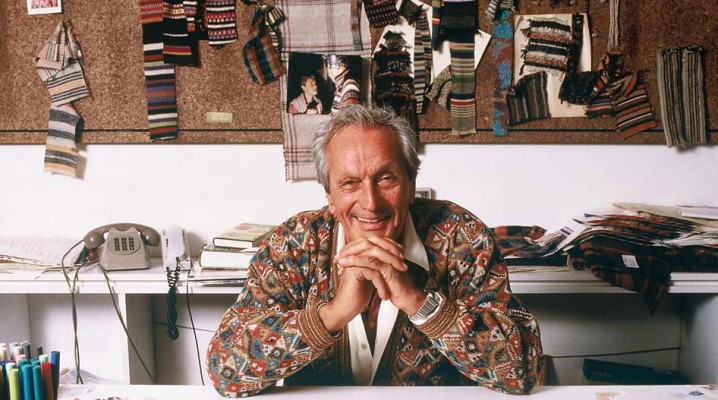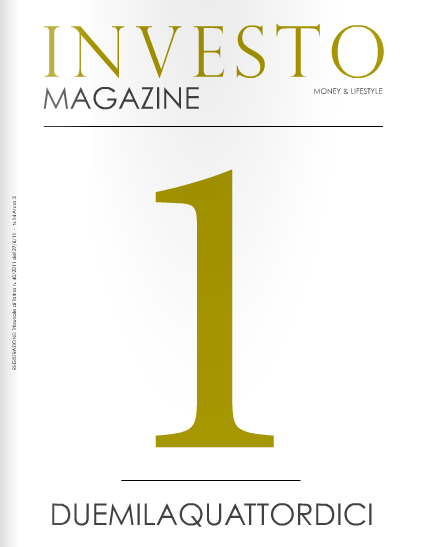Ottavio Missoni has gone without much notice, and leaving a huge void, in May this year.
On tiptoe, almost without wanting to interfere, that sober and moderate style that has marked his entire existence.
A life as a novel, the one of this famous Italian fashion designer, known for having revolutionized the style and fashion of several decades.
And, in fact, a novel, this genius of fashion, two years ago, he really wrote in the form of autobiography, with more than an explicative title: “A life on the woollen thread”.
Born in Dubrovnik, Dalmatia, in 1921, Ottavio Missoni spent his childhood in Zara.
Here he developed a passion about sport, specifically, to athletics, and became a promising professional runner.
Promises that he had been keeping.
In the 400 meters at first, 400 meters hurdles, then, the young and handsome Ottavio participated at the European Championships, winning the students world title in Vienna, in 1939.
Throughout his career, he won seven national titles; sport career that, in fact, he never entirely abandoned, participating to Italian competitions (masters category) up to over eighty years old.
But Ottavio, who is an energetic, strong boy, tempered by the effort and determination that every sport, necessarily entails and requires, lives in dark, gloomy, sad years. The years of disorientation, of sadness, of loss: the years of the second world war.
So, he, like many young people of the time, is called to war and, during the battle of El Elamein, is captured and spent four years in a prison camp.
And was lucky, Missoni, because he escaped the bombs, harbingers of death, taking refuge in a crater. But no to the prison camp, from where only few were able to evade.
Four years of captivity, where, always telling with great lightness, he learned to “sniff the herd”, understanding who to trust and that trust and by whom, however, Shun.
So he was, Ottavio Missoni, a man who lived his life lightly, even as a prisoner of war.
He usually did not set the alarm clock (“children are irritated, to be awakened this way”, used to say his mother), and read the papers in the morning to become a little bit melanchonic. And he did not look after the money: If you had or not, for him, a Spartan man of few pretensions, it did not matter much.
It’s when he returned from the war that he enrolled in high school, in Trieste; in spite of the fact he was proposed to emigrate to Australia, even the presence of beautiful native girls, he will tell later, moved him to leave Italy in search of fortune.
But for Ottavio, who had been also an actor of cinema and photo-novellas, meeting his wife was crucial, the woman who will be his wife for almost sixty years.
Her name is Rosita Jelmini, and she is from a a small town in the Varese province with a picturesque name: Golasecca.
Her family has a manufacturing company producing embroidered fabrics and shawls, and, when she meets his Rosita, Ottavio, with a friend of his, had just opened a knitting factory.
The rest is, indisputably, history.
Ottavio Missoni designed and produced a yarn and a Jersey inimitable over the centuries: multicolors, woven in zigzag, his garments become a must for ordinary people and for stars as well, as actor Nino Manfredi, extraordinary and wonderful man, who used – I say he loved – to wear with pride and frequency the cardigan of his friend Ottavio.
Manfredi’s wife, companion of a lifetime, will tell later, after the disappearance of the mythical Nino, that his passion for Missoni cardigan golf was worth him, among friends and not, the fun name “Missionary”.
Dressing Missoni was for him, and it still is for anyone, a distinctive mark, a choice of elegance, refinement and a touch of inspiration, that never hurts.
Missoni is a lively and full colour even in winter, it’s vivacity, is moving form, is vitality also in the town greyness.
Almost like in a continuum with his private life, Ottavio Missoni transposes on fabrics and patterns his adventurous life, rich in events, without ever forgetting the taste and sobriety that always that are related to his brand.
Life rich in events, the one of this athlete and designer, who has left a great void. The last one, three months before his death, the disappearing of his son Vittorio, missing, together with his wife, after having boarded on a tourist plane in Los Roques, in Venezuela.
And there, probably, in the heart of the gritty Ottavio, in the soul of a father who remains such even when his children, now adults, are flying on the wings of independence, something it is irreparably cracked.
He died of heartbreak, at 92 years.
His heart, already worn by the relentless pace of years, did not survive the unexplainable and unexplained disappearance of his beloved son.
Ottavio Missoni, simple and kind man, who was celebrating with his employees National holidays, raising a toast with them and among them, could not and did not want to endure the void left by his son Vittorio, that son so similar to him in manners and in politeness, in behaviour and altruism.
A son, Vittorio, that brought with him, in his baptismal name, the signature of what his father was and what had been, beloved son, to his father: the most colourful and awarded of victories.Ottavio Missoni se n’è andato, senza molto preavviso, e lasciando un vuoto incolmabile a maggio di quest’anno.
In punta di piedi, quasi senza voler disturbare, in quello stile sobrio e morigerato che ha contraddistinto tutta la sua esistenza.
Una vita da romanzo, quella di questo celebre stilista italiano, noto per aver rivoluzionato lo stile e la moda di parecchi decenni.
E, in effetti, un romanzo, questo genio della moda, due anni fa, l’ha davvero scritto, sotto forma di autobiografia, dal titolo più che esplicativo: “Una vita sul filo di lana”.
Nato a Dubrovnik, in Dalmazia, nel 1921, Ottavio Missoni trascorre la sua infanzia a Zara.
Qui si appassiona allo sport, nello specifico, all’atletica leggera, e ne diventa un promettente professionista agonistico.
Promesse che non si esime dal mantenere.
Nei 400 metri piani, prima, nei 400 metri ad ostacoli, poi, il giovane e bello Ottavio partecipa ai Campionati Europei, vincendo persino il titolo mondiale studentesco a Vienna, nel lontano 1939.
In tutta la sua carriera sportiva, vincerà sette titoli nazionali; carriera sportiva che, difatti, non abbandonerà mai del tutto, partecipando a competizioni italiane di categoria fino ad oltre ottanta anni compiuti.
Ma Ottavio, che è un ragazzo energico, forte, temprato dalla fatica e dalla determinazione che ogni sport, necessariamente, richiede ed impone, vive degli anni cupi, bui, mesti. Degli anni di disorientamento, di tristezza, di smarrimento: gli anni della seconda guerra mondiale.
Così, anche lui, come tanti giovani dell’epoca, viene chiamato in guerra e, durante la battaglia di El Elamein, viene catturato e trascorre quattro anni in un campo di prigionia.
Ed è fortunato, Missoni, perché è scampato alle bombe, foriere di morte, rifugiandosi in un cratere. Ma, al campo, no, a quello pochi son riusciti a sfuggire.
Quattro anni di prigionia, in cui, racconterà sempre con molta leggerezza, imparò ad “annusare il branco”, a capire di di potersi fidare e da chi, invece, rifuggire.
Era così, Ottavio Missoni, un uomo che viveva la propria esistenza con leggerezza, fosse anche da prigioniero di guerra.
Era solito non metter mai la sveglia (“i bambini si innervosiscono, a destarsi così”, soleva dire la sua mamma), e leggere i giornali al mattino per immalinconirsi un po’. E non badava al denaro: se ne avesse o non ne avesse, per lui, uomo spartano e di poche pretese, non contava granché.
E’ al ritorno dalla guerra che si iscrive al liceo, a Trieste; nonostante gli avessero, infatti, proposto di emigrare in Australia, nemmeno la presenza di belle ragazze autoctone – affermerà in seguito – lo spinse ad abbandonare l’Italia in cerca di fortuna.
Ma per Ottavio, che fu anche attore di cinema e di fotoromanzi, fu determinante l’incontro con sua moglie, la donna che gli sarà accanto per quasi sessant’anni.
Si chiama Rosita Jelmini, ed è di un paese del varesotto dal nome pittoresco: Golasecca.
La sua famiglia ha un’azienda produttrice di tessuti ricamati e scialli, e, quando incontra la sua Rosita, lo stesso Ottavio, in società con un suo amico sportivo, aveva appena aperto un laboratorio di maglieria.
Il resto è, inconfutabilmente, storia.
Ottavio Missoni idea e realizza un filato ed una maglia inconfondibili nei secoli: multicolor, intessuti a zigzag, i suoi capi diventano must di gente comune come di star, come Nino Manfredi, attore straordinario e uomo meraviglioso, che era solito – direi amava – indossare con frequenza e fierezza i cardigan del suo amico Ottavio.
La moglie di Manfredi, compagna di una vita, racconterà in seguito, dopo la scomparsa del mitico Nino, che proprio la sua passione per i golf di Missoni gli era valso, tra amici e non, il divertente appellativo di “Missionario”.
Vestire Missoni era per lui, ed è tuttora per chiunque, un segno distintivo, una scelta di eleganza, raffinatezza ed un pizzico di estro che non guasta mai.
Missoni è colore vivo e pieno anche in inverno, è brio, è forme in movimento, è vivacità anche nel grigiore cittadino.
Quasi come in un continuum con la sua vita privata, Ottavio Missoni traspone su modelli e tessuti la sua vita avventurosa e ricca di eventi, senza mai tralasciare il gusto e la morigeratezza che da sempre sono accomunati alla sua firma.
Vita ricca di accadimenti, quella di questo atleta stilista che ha lasciato un grande vuoto; ultima, a tre mesi dalla sua morte, la scomparsa del figlio Vittorio, disperso, assieme alla moglie, dopo esser salito a bordo di un aereo turistico a Los Roques, in Venezuela.
E lì, probabilmente, nel cuore del grintoso Ottavio, nell’animo di un padre che rimane tale anche quando i suoi figli, ormai adulti, spiccano il volo sulle ali forti dell’indipendenza, qualcosa si è incrinato irrimediabilmente.
E’ morto, infatti, di crepacuore, a 92 anni.
Il suo cuore, già provato dall’incedere inesorabile degli anni, non ha retto all’assenza inspiegabile ed inspiegata del suo amato figlio.
Ottavio Missoni, uomo semplice e gentile, che festeggiava con i suoi dipendenti le feste comandate, brindando con loro e tra loro, non ha potuto e voluto sopportare il vuoto lasciato da suo figlio Vittorio, quel figlio così simile a lui nei modi e nel garbo, nei comportamenti e nell’altruismo.
Un figlio – Vittorio – che portava con sé, nel suo nome di battesimo, la firma di ciò che era suo padre e di ciò che era stato lui, figlio amato, per suo padre: la più colorata e premiata delle vittorie.
» 2013 - Numero 5 » Ottavio Missoni: a lifetime of sport...






 youhost
youhost